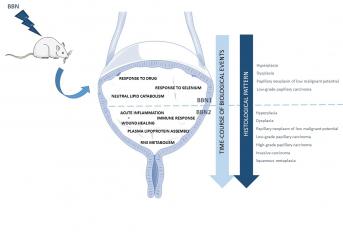Associação Portuguesa de Investigação em Cancro
Proteome profiling of urine with mass spectrometry approaches and bioinformatic tools allows an integrative perspective of the biological processes modulated by urothelial carcinoma
Proteome profiling of urine with mass spectrometry approaches and bioinformatic tools allows an integrative perspective of the biological processes modulated by urothelial carcinoma

Using a well-established animal model of urothelial carcinoma, we performed urine proteome profiling from healthy animals and animals with urothelial carcinoma at two time-points of disease pathogenesis. Data analysis highlighted the biological processes involved in disease pathogenesis such as, for instance, response to selenium and to drugs, neutral lipid metabolism at earlier stages of disease, and inflammation, immune response and wound healing at advanced stages.
Authors and Affiliations:
Rita Ferreira, Rui Vitorino, António Barros, Telma Martins, Sandra Magalhães e Fábio Trindade – Departamento de Química da Universidade de Aveiro
Francisco Amado - Escola Superior de Saúde da Universidade de Aveiro
Paula Oliveira, Maria João Pires, Bruno Colaço – Departamento de Ciências Veterinárias, Universidade de Trás-os-Montes e Alto Douro
Lúcio Santos – Instituto Português de Oncologia do Porto
Abstract:
Bladder cancer is estimated to be the ninth most common malignancy with a high rate of recurrence and progression despite therapy, early diagnosis being crucial for timely intervention. Using a well-established animal model of urothelial carcinoma, we performed a comprehensive analysis of urine proteome profile from healthy animals and animals with urothelial carcinoma at two time-points of disease pathogenesis. GeLC-MS/MS, followed by bioinformatics analysis of unique proteins and the ones present in significantly distinct levels among groups, highlighted the biological processes involved in disease pathogenesis such as, for instance, response to selenium and to drugs, neutral lipid metabolism at earlier stages of disease, and inflammation, immune response and wound healing at advanced stages. Proteins from up-regulated biological processes might be seen as putative disease biomarkers. These include, for example, cadherins, lipoproteins, and glysosyltransferases, which may be included in multimarker strategies. Taken together, the data support the application of urine proteomics for the identification of the biological processes modulated by bladder cancer in an integrative perspective. The present exploratory urinary proteomic analysis might be seen as an important starting point for studies targeting urinary proteins in human, aiming at the implementation of novel laboratory approaches for the detection and successful management of urothelial carcinoma.
Journal: Molecular Biosystems
Link: http://pubs.rsc.org/en/journals/journalissues/mb#!recentarticles&all






